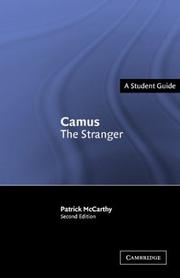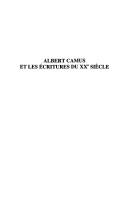| Listing 1 - 10 of 33 | << page >> |
Sort by
|
Book
ISBN: 1412372127 Year: 2011 Publisher: Chicoutimi : J.-M. Tremblay,
Abstract | Keywords | Export | Availability | Bookmark
 Loading...
Loading...Choose an application
- Reference Manager
- EndNote
- RefWorks (Direct export to RefWorks)
Book
ISBN: 9004419241 Year: 2020 Publisher: Leiden ; Boston : Brill,
Abstract | Keywords | Export | Availability | Bookmark
 Loading...
Loading...Choose an application
- Reference Manager
- EndNote
- RefWorks (Direct export to RefWorks)
"It has become customary that scholarly works devoted to the study of Camus's philosophical thought begin with an apology. It is as if any treatment of this philosophy was still haunted by the necessity to protect the writer from overly critical opinions, stemming from the conviction that Camus was un philosophe pour classes terminales".
Book
ISBN: 1469658224 1469658216 Year: 1964 Publisher: Chapel Hill, University of North Carolina Press,
Abstract | Keywords | Export | Availability | Bookmark
 Loading...
Loading...Choose an application
- Reference Manager
- EndNote
- RefWorks (Direct export to RefWorks)
Book
ISBN: 1782843132 Year: 2016 Publisher: Eastbourne, [England] : Sussex Academic,
Abstract | Keywords | Export | Availability | Bookmark
 Loading...
Loading...Choose an application
- Reference Manager
- EndNote
- RefWorks (Direct export to RefWorks)
"Singapore Malays subscribe to mostly traditional rather than modern interpretations of Islam. Singapore state officials, however, wish to curb the challenges such interpretations bring to the country's political, social, educational and economic domains. Thus, these officials launched a programme to socially engineer modern Muslim identities amongst Singapore Malays in 2003, which is ongoing. Negotiating Malay Identities in Singapore documents a variety of ethnographic encounters that point to the power struggles surrounding two basic and very different ways of living. While the Singapore state has gained some successes for its project, it has also faced significant and multiple setbacks. Amongst them, state officials have had to contend with traditional Islamic authority that Malay elders carry and who cannot be ignored because these elders are time-entrenched figures of repute in their community. One of the book's significant contributions is that it documents how Singapore, an avowedly secular state, has now turned to Islam as a tool for governance. Just as significant are the insights the study provides on another aspect of Singapore state governance, one usually described as 'authoritarian'. The book demonstrates that even authoritarian states can face serious obstacles in the face of religion's influence over its followers. Moreover, the academic literature on Singapore Malays is sparse and this work not only fills gaps in the existing literature but provides new and original research data"--
Book
ISBN: 1412368359 Year: 2010 Publisher: Chicoutimi : J.-M. Tremblay,
Abstract | Keywords | Export | Availability | Bookmark
 Loading...
Loading...Choose an application
- Reference Manager
- EndNote
- RefWorks (Direct export to RefWorks)
Authors, French. --- Diaries --- Authorship --- History. --- Camus, Albert, --- Camus, Albert, 1913-1960.
Book
ISBN: 1412368588 Year: 2010 Publisher: Chicoutimi : J.-M. Tremblay,
Abstract | Keywords | Export | Availability | Bookmark
 Loading...
Loading...Choose an application
- Reference Manager
- EndNote
- RefWorks (Direct export to RefWorks)
Camus, Albert, --- Political and social views. --- France --- Politics and government

ISBN: 9780511803062 9780521832106 9780521539777 9780511164408 0511164408 0521832101 0521539773 0511166338 9780511166334 0511803060 9780511165207 051116520X 0511162804 9780511162800 0511164408 0521832101 0521539773 1107148685 9781107148680 1283329182 9781283329187 0511165544 9780511165542 9786613329189 6613329185 0511566689 9780511566684 Year: 2004 Publisher: Cambridge, UK New York, NY Cambridge University Press
Abstract | Keywords | Export | Availability | Bookmark
 Loading...
Loading...Choose an application
- Reference Manager
- EndNote
- RefWorks (Direct export to RefWorks)
This handy guide places Albert Camus' The Stranger, one of the seminal texts of existentialism and twentieth-century literature in general, in the context of French and French-Algerian history and culture. In it, Patrick McCarthy examines the way the work undermines traditional concepts of fiction. In addition, he explores the parallels and the contrasts between Albert Camus's work and that of Jean-Paul Sartre. Overall, this account provides students with a useful companion to The Stranger. This second edition boasts a revised guide to further reading and a new chapter on Camus and the Algerian War.
French literature. --- Camus, Albert, --- Arts and Humanities --- Literature
Book
ISBN: 1469637588 9781469637587 0807891193 9780807891193 Year: 2017 Publisher: University of North Carolina at Chapel Hill Department of Romance Studies
Abstract | Keywords | Export | Availability | Bookmark
 Loading...
Loading...Choose an application
- Reference Manager
- EndNote
- RefWorks (Direct export to RefWorks)
French literature --- Greek influences. --- Camus, Albert, --- Knowledge --- Literature.
Book
ISBN: 8413775485 Year: 2021 Publisher: Madrid : Dykinson, S.L.,
Abstract | Keywords | Export | Availability | Bookmark
 Loading...
Loading...Choose an application
- Reference Manager
- EndNote
- RefWorks (Direct export to RefWorks)
World War, 1939-1945 --- Totalitarismo. --- Derecho y literatura. --- World War, 1939-1945. --- Camus, Albert, --- Camus, Albert, --- Camus, Albert, --- Camus, Albert, --- Pensamento político y social. --- Crítica e interpretación.

ISBN: 2910663884 2848323728 Year: 2003 Publisher: Arras Artois Presses Université
Abstract | Keywords | Export | Availability | Bookmark
 Loading...
Loading...Choose an application
- Reference Manager
- EndNote
- RefWorks (Direct export to RefWorks)
Jacqueline Lévi-Valensi note que le colloque dont ce volume est la mémoire, Camus et les écritures du xxe siècle, est à la fois continuité et ouverture. « Continuité, parce qu’il se situe dans le prolongement des travaux menés depuis le Colloque de Cerisy-la-Salle qui, en 1982, était le premier à se tenir en France et a vu naître la Société des études camusiennes » ; continuité aussi par l’origine, l’âge et la diversité des intervenants. Ouverture parce que « les oeuvres de Camus sont ici abordées dans leur relation à l’autre, au Maghreb, en particulier, mais également à d’autres mondes européens, à d’autres continents, à d’autres écrivains, à d’autres écritures, sous le signe, bien camusien, du dialogue. C’est peut-être pourquoi son oeuvre est à la fois singulière et universelle, classique et pourtant si moderne, tenant un “langage clair” et gardant ses énigmes, née “dans la chair et la chaleur des jours” et porteuse d’une véritable mythologie, qui nous parle, simultanément de la tragédie de la vie et du bonheur de vivre, qui nous apprend l’émerveillement et la lucidité. Une oeuvre ancrée dans les fureurs de son temps, et qui reste d’une étonnante actualité ». Proposant de mettre cette trentaine de contributions sous l’éclairage du double pouvoir de l’écriture, sur l’écrivain et sur ses lecteurs, elle conclut : « Camus ne cesse de nous dire qu’il y a en l’homme quelque chose qui échappe aux violences de l’histoire et qui refuse de mourir, et que ce sont les artistes qui témoignent de cette part irréductible. Peut-être pouvons-nous alors placer ce dialogue entre les œuvres sous l’égide d’une phrase qui résume le bonheur grave de la création : Écrire, ma joie profonde ».
Camus, Albert --- Literature, Romance --- interprétation --- littérature comparée --- œuvre littéraire --- critique --- littérature française --- écrivain
| Listing 1 - 10 of 33 | << page >> |
Sort by
|

 Search
Search Feedback
Feedback About UniCat
About UniCat  Help
Help News
News